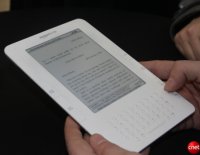Where is the power in ebooks?


Is it in the look-and-feel of the device? Is it in the content? Is it in the standard? (Picture by David Carnoy for CNET.)
While all these are important, I have another idea of where the power lies. I think it lies in connectivity.
As good as the Kindle is, as good as Google Books are, they are in the end books. They are mere digital representations of an analog product, complete with footnotes.
But an ebook can be more. It should be more, and before it becomes the standard reading interface it will be more.
I have a little demonstration of this future in my PC right now. It's an updated version of my 2002 least-seller The Blankenhorn Effect. I have retitled it Moore's Lore: How Better and Better gets Faster and Faster.
What gives this book its value? Hyperlinks.
Instead of footnotes, I'm checking references online, and changing those which disappeared since the first edition. Then I'm embedding the final links in the text as hyperlinks. The final product is an .odt file, but is easy to turn into a .html file, or a Kindle file, any other kind of file you want.
The key is I did not design this book for print. I designed it for electronic use. The ebook reader which is best for this book has an open interface to the Web, so readers can double-check anything with a click and start their own adventures with the content.
In editing the book, by the way, I found one of the biggest changes in the Web this decade has been Wikipedia, but not for the reason you think.
Wikipedia reduces the problem of disappearing links. The entries there have more stable paths than links to corporate Web sites, or even some news sites. This makes them handy as references.
Back to the reader. Amazon's Kindle has limited Internet connectivity, designed for the downloading of books from the Kindle Store. I need more. I need to reach from the book outward toward the Web. And I need that capability to be as transparent as it is on this Web page.
The real power of an ebook lies in its connection to the Web. Hyperlinks give books that fourth dimension they have lacked for 600 years.
If we're going to lose the great interface of a summer read, it should be for something that offers more than the feel of a good book can give you. Connectivity is the killer ebook app.